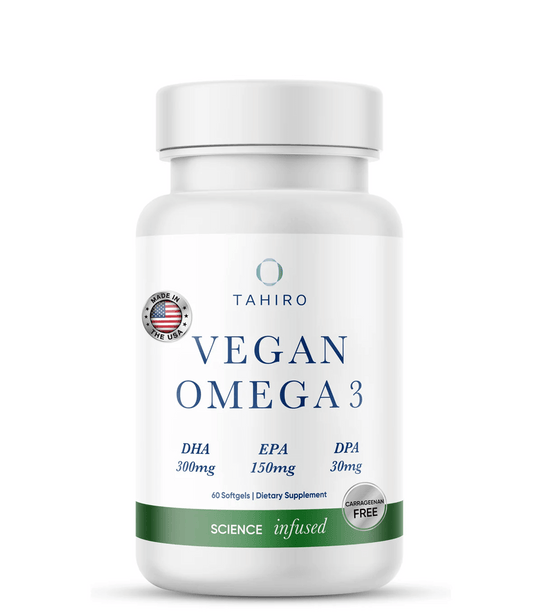In today’s world, we know the benefits of omega-3 fatty acids. They are known to be anti-inflammatory and promote brain health. However, while most people know these benefits, they are often overlooked.
Omega-3 deficiency can affect several people without their knowledge, which is why it is often referred to as a silent epidemic. Research shows that less than 20% of people have an adequate intake of omega-3 fatty acids (1).
In this article, we will explore omega-3 fatty acids, their importance in overall health, the symptoms and signs of deficiency, and how to prevent and treat this often overlooked condition.
What Are Omega-3s: Why Do They Matter?
Omega-3 fatty acids are essential polyunsaturated fatty acids. They are essential because the body cannot produce them independently, so they must come from another source. There are three main types of omega-3 fatty acids: alpha-linolenic acid (ALA), eicosapentaenoic acid (EPA), and docosahexaenoic acid (DHA).
There are many benefits to omega-3 fatty acids. Here are some of the benefits seen from these fatty acids.
-
Heart health. Omega-3 can help reduce inflammation and triglyceride levels, improving heart health (2).
-
Brain function. Research shows that omega-3 fatty acids (especially DHA) can be crucial for brain development in children and improve cognitive function in adults (3).
-
Eye health. Omega-3 fatty acids can help improve eye health and reduce the risk of age-related macular degeneration (4).
-
Mood and anxiety. Evidence suggests that omega-3 fatty acids may help improve mood and reduce symptoms of depression and anxiety (5).
-
Joint health. Thanks to its anti-inflammatory properties, omega-3 may help reduce joint pain and stiffness. It may also help reduce symptoms of Rheumatoid arthritis (6).
Omega-3 fatty acids are found in both animal and plant-based sources. You can get an adequate amount of omega-3 fatty acids from cold-water fish, flaxseeds, chia seeds, walnuts, and algae (7).
Omega-3 Deficiency: Symptoms And Signs
One problem with omega-3 deficiency is that it may be difficult to determine. It can manifest in various ways, and its symptoms may be subtle, making it even more challenging to identify.
Here are some common signs and symptoms of omega-3 deficiency.
- Skin irritation and dryness. Dry and sensitive skin is one of the first signs of omega-3 deficiency. Research shows that omega-3 can help improve the integrity of the skin barrier. This allows for less moisture to be lost (8).
-
Mood swings. Omega-3 fatty acids are crucial for brain health. They have been shown to have neuroprotective and anti-inflammatory effects. Since omega-3 has been linked to improved mood, a lack of omega-3 may cause mood changes.
- Dry eyes. Just like in skin, omega-3 is responsible for keeping moisture in the eyes. That is why, in some cases, health professionals recommend supplementing with omega-3 to help relieve dry eyes (9).
-
Hair changes. Omega-3 is also responsible for keeping moisture in the hair. So, changes in the hair’s texture, integrity, and density may indicate low levels of omega-3.
- Joint pain. As mentioned, one of the most important health benefits of omega-3s is reduced joint pain. Low levels of omega-3 may result in increased joint pain and stiffness.
- Fatigue and insomnia. Evidence suggests that low levels of omega-3 fatty acids may lead to fatigue and insomnia (10).
Is There A Test I Can Take For Omega-3 Deficiency?
Yes, tests are available to help determine if you have omega-3 deficiency. While these tests can provide valuable information about omega-3 levels, they are not often requested by individuals or ordered by doctors.
If you suspect an omega-3 deficiency condition, talk to your healthcare provider. Based on your medical record, they can help you determine if you need a blood test or a plasma blood test. Once the results are in, your doctor will advice on the best course of action.
How Long Does It Take To Correct Omega-3 Deficiency?
The time required to recover from omega-3 deficiency can vary. Several factors may impact the time required to restore omega-3 levels: Dietary Sources, Severity of Deficiency, Supplement Use, Individual Metabolism, Overall Health Status, Consistency, and Lifestyle Factors.
Generally speaking, you may start to notice improvements and reductions in signs and symptoms of omega-3 deficiency within a few weeks to a few months. However, it may take several months or even years to correct an omega-3 deficiency for some people. That being said, It is safe to say that for most individuals, it takes about 6 months to build healthy omega-3 levels in the body, but, as mentioned, this depends on how often you include food rich with omega-3 and if you take your supplements daily.
Do Vegans Have Omega-3 Deficiency?
Yes, vegans can be at risk of omega-3 deficiency if they don’t pay attention to their omega-3 intake and make the necessary dietary adjustments.
The most common omega-3 sources are cold-water fish and seafood, making it challenging for vegans to obtain their daily dose.
However, some plant-based omega-3 sources include algae, flaxseeds, hemp, and chia seeds. If you don’t get enough omega-3 through food, you can always add an algae-based omega-3 supplement.
How Do I Improve My Omega-3 Status If I Have A Deficiency?
If you have been diagnosed with an omega-3 deficiency or need to increase your intake, here are several strategies to consider.
Increase omega-3 foods. Add foods high in omega-3, such as cold-water fish, flaxseeds, chia seeds, hemp seeds, and algae.
Add omega-3 fortified foods. Look for foods and beverages fortified with omega-3s, including plant-based milk, cereal, and bread.
Consider diet counseling. Consult with a health professional who can create a personalized nutrition plan tailored to your goals and needs.
Add an omega-3 supplement. Algal oil supplements are derived from microalgae and provide a vegan-friendly source of EPA and DHA.
Limit omega-6 fats. Reduce the consumption of omega-6 fatty acids (found in vegetable oils and processed foods), as they compete with omega-3s for absorption.






